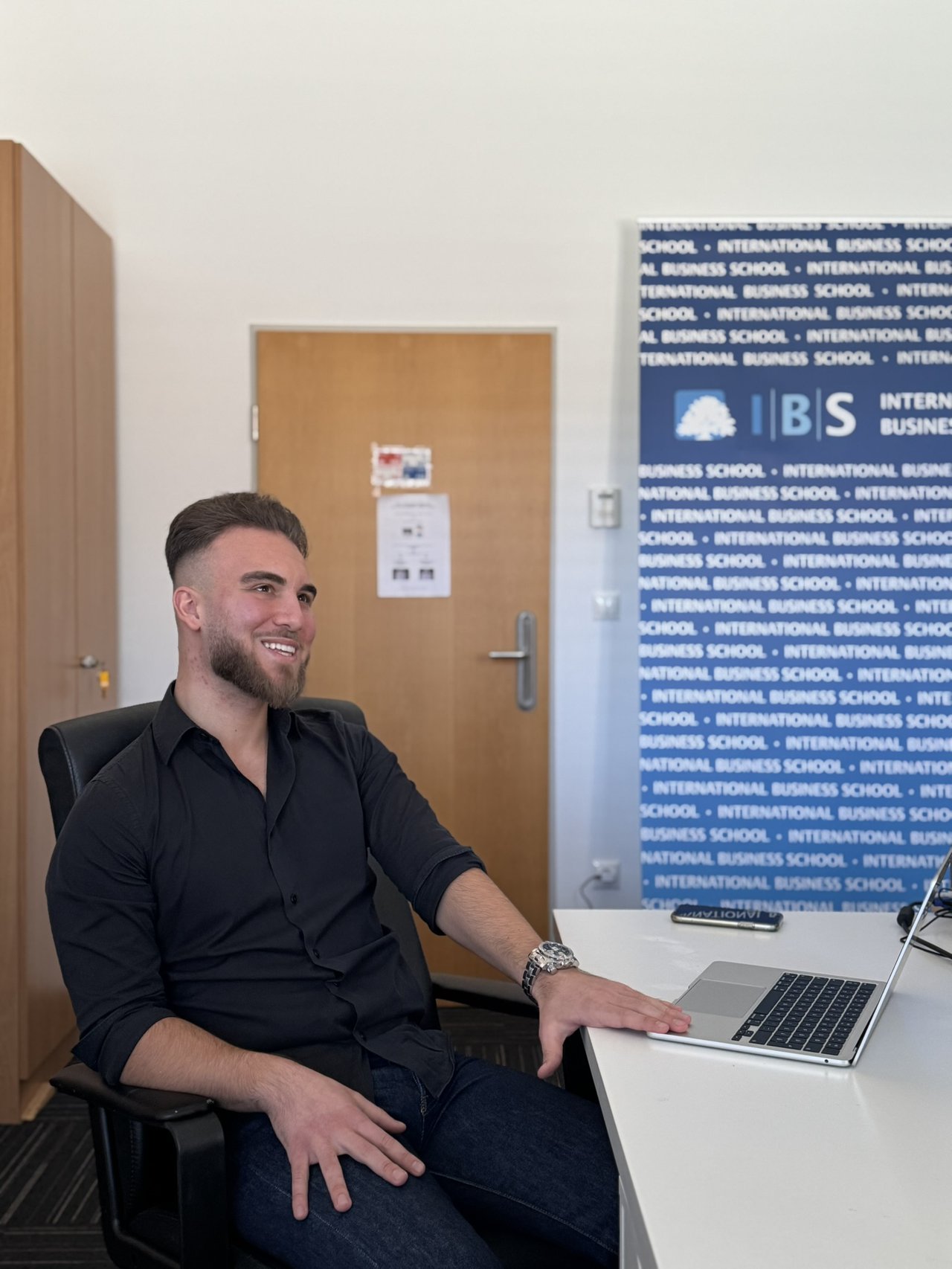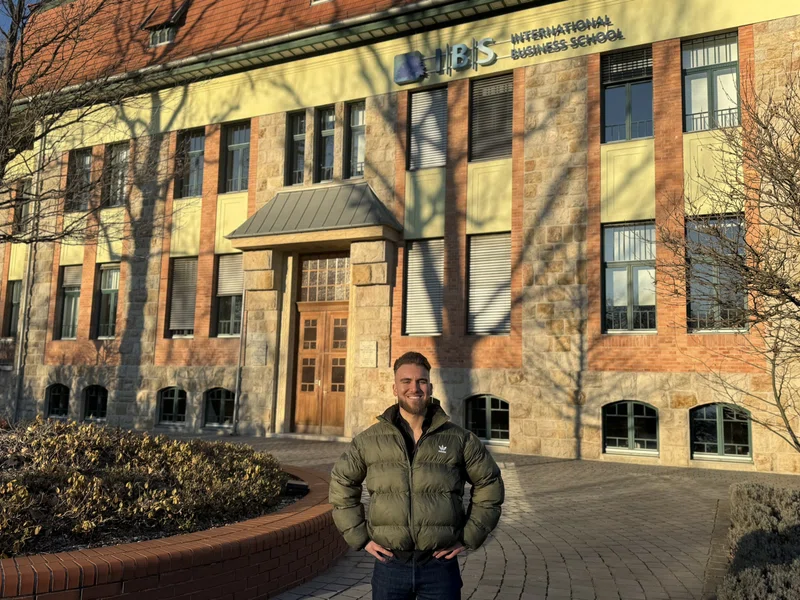We are proud to share the news that Máté Kollár, a graduating student of the International Relations undergraduate programme, has been admitted to two prestigious American universities—Columbia University and Georgetown University—thanks to his outstanding achievements. Máté will continue his studies in the field of Russian-Eurasian and Eastern European studies, further deepening his knowledge of the region’s political, economic, and social processes.
Even during his university years, Máté actively built his professional experience: as a first-year student, he interned at the U.S. Embassy in Budapest and later at the HUN-REN Centre for Social Sciences, where he contributed to mapping international political networks and analyzing parliamentary speeches to identify shifts in narratives related to COVID-19 and migration. His success is not only a testament to his exceptional performance but also serves as an inspiration for students considering an international career and further studies.
First of all, congratulations! You’ve been accepted to two highly prestigious universities, Columbia and Georgetown. Which one will you choose, and what are the most important factors in your decision?
The most important question for me is where I would feel more at home. Columbia is world-renowned and one of the most prestigious universities, plus it’s located in the international hub of New York. However, Georgetown excels in my field—politics, diplomacy, and economics. It has produced graduates like Bill Clinton and Lyndon B. Johnson, and because it’s located in Washington, D.C., just 15 minutes from the government district and the White House, it offers outstanding professional opportunities.
While Columbia is better known in mainstream culture, both institutions are equally recognized in professional circles. That’s why university rankings are not my deciding factor; instead, I’m focusing on which environment would best support my professional and personal development.
At both universities, you applied for Russian-Eurasian and Eastern European studies. What exactly does this programme cover, and what were the requirements for admission?
It’s an interdisciplinary programme covering history, economics, culture, foreign and security policy, and language training related to the post-Soviet region and the Balkans. As part of the programme, I will study either Russian or Serbian-Croatian—I haven’t made my final decision yet, but I’m leaning towards Serbian-Croatian.
The application process required me to submit a 4,500-word academic writing sample demonstrating my research skills. Additionally, I wrote a 500-word personal essay on why I wanted to study at the given university and a 1,000-word essay about my past studies and professional interests. I also had to include a five-page resume as part of my application.
How did your interest in international relations and IBS come about?
Even in high school, I felt that the traditional curriculum was sometimes too limiting for me, as I was more interested in topics beyond classroom materials—history, culture, languages, films, music—especially in relation to Eastern Europe and the post-Soviet region. I was always fascinated by international relations, so I looked for a university programme where I could seriously engage with these subjects. When I discovered international studies and saw the career paths it offered, I realized it was the perfect starting point for me.
I chose IBS from among several universities, but one decisive experience solidified my decision. At that time, the World Tour competition had just started, and when I read its description, I felt like it was made for me. Since I was already considering IBS, I applied to the competition simultaneously. During the competition, I met other students with similar interests, and reaching the finals was particularly memorable—I spent time with nine other finalists, many of whom I still have strong connections with today. Seeing how many like-minded people chose IBS confirmed that it should be my top choice.
How did IBS contribute to your academic success?
IBS played a crucial role in giving me the confidence and preparation to apply successfully to American universities. The institution’s student-centered education system allowed me to develop according to my interests.
This became especially clear when I gained experience at other universities. Last summer, through the U.S. State Department’s SUSI programme, I studied modern democracy and journalism at Arizona State University in Phoenix. I realized that I was as well-prepared—if not better—than my American peers and other Eastern European students in the programme.
During my Erasmus semester at the University of Bologna, I experienced a different environment. As part of a large institution with over 90,000 students, I found that students felt more distant from their professors. In contrast, at IBS, I felt that professors genuinely considered students’ individual interests and helped us maximize our potential.
IBS also provided significant advantages in gaining professional experience. The university has excellent partnerships, allowing me, as an undergraduate student, to work in institutions like the U.S. Embassy in Budapest. These experiences not only helped my professional development but also gave me the confidence to believe that I could compete for the best international programmes.
One of the biggest validations for me was when I realized that at the University of Bologna, I was completing two-thirds of my courses at the master’s level, working alongside students who were years ahead in their studies, yet I performed at the same level as them. I had a similar experience during my internships, where I worked with colleagues who were much further along in their academic journeys, yet I was able to match their performance. This confirmed that the education at IBS is competitive and enabled me to acquire knowledge and skills in two years that might take longer to gain elsewhere.
Furthermore, IBS’s supportive community and personal mentorship from professors were invaluable. When I started considering applying to master’s programmes abroad, my professors encouraged me and provided guidance. Their support and the personalized attention I received played a key role in giving me the courage to aim high—and ultimately succeed.
Máté’s story proves that talent, hard work, and the right educational and professional background can open limitless opportunities for students. The knowledge and experience he gained at IBS helped him apply confidently to some of the world’s leading universities, and now he stands at the beginning of another exciting chapter.
We congratulate him on this outstanding achievement and hope his success continues to inspire our students to dream big and work persistently toward their goals!

